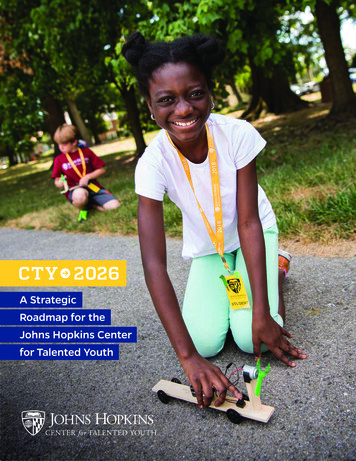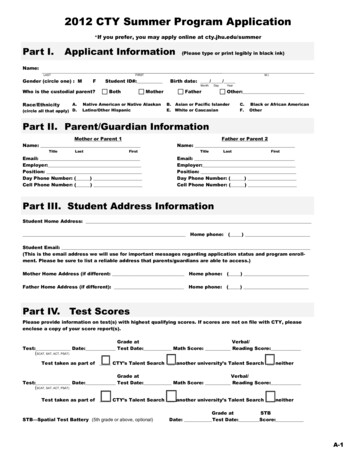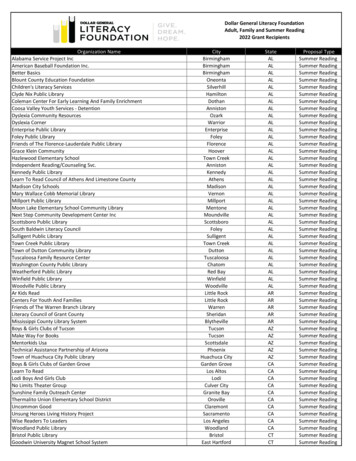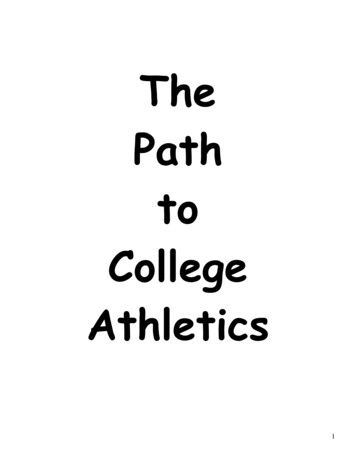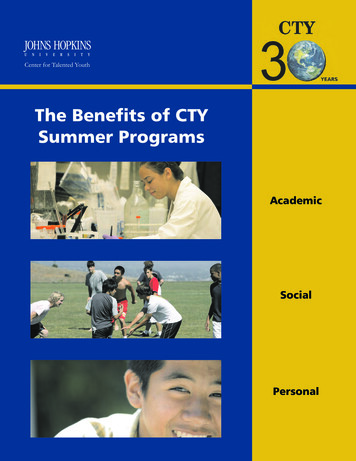
Transcription
Center for Talented YouthThe Benefits of CTYSummer Programs Picture AcademicSocialPersonal
OVERVIEWACADEMIC BENEFITS2Academic rigor and challenge; quality instruction . 2Gains in learning . 3Acceleration . 4Positive academic role models . 5Skill development . 6Heightened interest in an academic subject . 7Increased academic confidence and setting higher academic goals . 7College-related benefits . 8SOCIAL AND PERSONAL BENEFITS9Becoming friends with other bright students . 9Sense of belonging, social-support network, social adeptness, and confidence . 9Increased maturity and independence . 10More open-mindedness . 10Life-long knowledge and self-discovery . 11BENEFITS FOR UNDERREPRESENTED STUDENTS12Gains in learning . 12Acceleration . 13Increased SAT scores . 13College-related benefits . 13Greater impact of benefits . 14OVERLAP AND MULTIPLICITY OF BENEFITS15Overlap of benefits diagram . 15Multiplicity of benefits chart . 17REFERENCES18
BENEFITS OF CTY SUMMER PROGRAMSEach summer, thousands of students in grades 2-12 attend CTY's Summer Programs offered at collegesand universities throughout the United States and abroad. The programs are three weeks long, andstudents take only one of the rigorous courses at a time. This intense immersion in a subject has provento be both challenging and stimulating for students of high ability. In addition to their course work,students enjoy a rich experience outside the classroom that includes activities ranging from sports to artsand crafts to special events (e.g., student talent shows, dances, or socials).Courses span a range of fields in the arts and sciences, including mathematics, biology, chemistry,physics, language, philosophy, history and writing. Courses also include the disciplines of engineeringand computer science. All courses are challenging and taught well above grade level. Teachersemphasize active learning and encourage students to use knowledge in independent and creative ways.CTY classrooms are characterized by high expectations for student performance, low student/instructor ratios, faculty who are well versed in their fields, motivated students, active student participation, and flexible instruction.Summer Program courses are extensively evaluated, and student outcomes have been the focus ofnumerous research studies over the years. In a number of these studies, Summer Program participantshave been compared to similar-ability students who have not participated in CTY's Summer Programs sothat the added value of participation can be documented.Students and families routinely contact CTY about the benefits they have experienced as a result ofprogram participation. In addition, an active Alumni Association provides CTY with an on-going longterm perspective on program benefits and outcomes.With the help of a grant from the U. S. Department of Education, CTY's Research Department was ableto identify, collate, organize, integrate, and analyze over 30 years of research findings, evaluation data,alumni surveys, interviews, and unsolicited letters/e-mails from students and families regarding thebenefits and outcomes of participation in CTY's Summer Programs. This document summarizes thefindings that emerged. A technical report that provides extensive background for the project, statisticaldata, accompanied by charts and graphs, is available. At the end of this document is a list of allresources, technical reports, and published research papers that were used to inform this project.1
ACADEMIC BENEFITSThe CTY Summer Program experience exposes bright students to academic rigor andchallenge, as well as quality instruction that may not be found at students' regular schools.Parents report opportunities for challenge as one of themajor factors in having their child attend CTY. At theend of CTY's Summer Programs, all students are askedto rate their satisfaction with various aspects of theprogram. Year after year, students strongly agree that:“the course was challenging for me,” “the instructor'soverall effectiveness as a teacher was excellent,” and“the instructional assistant's overall effectiveness wasexcellent.” In follow-up surveys, parents also expresshigh satisfaction with the level of academic rigor andquality of instruction.When CTY alumni are asked about their experience inCTY's Summer Programs, sometimes many years later,they say that the Summer Programs exposed them torigorous and challenging courses and quality instructionnot available in their school. This is a consistentfinding across studies and over time. Even the highestability students attending CTY programs indicate theimportance of academic rigor and challenge providedby CTY summer courses.2“I thought theinstructors weredynamic. They wereencouraging but alsowere some of the firstmentors I had that reallychallenged me.”“The coursework inwhich I participated as aCTY student has beencomparable to work I'vedone as a collegestudent.”
ACADEMIC BENEFITSSummer Program participants make substantial gains in learning challenging materialduring the three-week course.Achievement gains (i.e., increases in content knowledge andacademic skills) are a very important and well-documented partof CTY's Summer Programs. To measure this gain, students aregiven an assessment at the beginning and at the end of the threeweek course. The scores from this pre- and post-assessment arecompared to determine how much students learn over the lengthof the course.Bright students vary in interests and exposure to academiccontent. Therefore, pre-assessment scores may vary widelywithin a class and provide important diagnostic information.Armed with this diagnostic information, instructors can tailor thecourse to meet the needs of the range of students within theirclass.“It took me only twoweeks to complete anentire year's worth ofmath. I was able tolearn at my own paceand subsequently wasmore challenged than atmy high school.”“I still remember muchof what I learned andI'm in my last year ofcollege now.”The following graph shows average pre-assessment and postassessment scores for students, by type of course. Acrosscourses, the average pre-assessment score is about 30 percentand the average post-assessment score is about 80 percent. Parents often describe the substantial gainsmade by their children: “Our daughter covered more in three weeks than is expected of her for [the]entire school year” and “the [CTY] course covered everything you would learn in a typical collegecourse.”Average Pre-Assessment and Post-Assessment Scoresby Course TypePercent of Items 3MathComputer SciencePost-assessment
ACADEMIC BENEFITSAfter taking a CTY summer course, many CTY students report acceleration in theirschool's curriculum.Many students and their parents indicate that they attend CTY'sSummer Programs in order to move ahead to higher-levelcourses in school. For students interested in accelerating, CTYrecommends that students and their parents meet with schooladministrators (before and after taking a CTY course) to discusspossible acceleration options. Most of the students who takeCTY courses that are similar to traditional high school math andscience courses do advance to higher-level courses in theirschools. This finding is relatively stable over 14 years.“I received credit forseveral classes and wasable to jump ahead inschool (e.g., takingCalculus and APComputer Science) inmy first year of highschool).”Of students who received placement into a higher-level math orscience course in their home school, almost all felt as wellprepared, if not better prepared, for the higher-level course than their classmates.When compared to bright students who did not attend a CTY summer course, CTY students reporttaking more advanced-level courses in high school at an earlier time (e.g., take AB and BC Calculusbefore 12th grade) and report enrolling in more college courses while attending high school. CTYstudents also report taking more Advanced Placement (AP) courses than equally bright students who donot attend CTY's Summer Programs. CTY research has found that as the number of CTY courses takenincreases, so does the number of AP courses. Opportunities to take more advanced-level courses earlier(i.e., acceleration) is an important added value of CTY program participation.AverageNumber of AP CoursesAverage Number of AP Courses by Number of CTY Summer Courses1098765401 and 23 and 45 and 6Number of CTY Summer Courses47
ACADEMIC BENEFITSMost CTY students report that the summer experience provided exposure to positiveacademic role models.At the end of courses, the majority of CTY studentsagree that “at least one faculty or staff person at CTYhad a strong positive influence” on their intellectual orpersonal development. The majority of CTY alumnialso report this strong positive influence. The staffmember most identified as a positive influence is theinstructor. Teaching assistants and resident assistantsare also mentioned.Positive role models also include other students. Inthe words of a CTY participant, “CTY was singlehandedly the most influential experience in my life interms of the people I met and how that shaped andformed my future interactions with friends and others.”Another student said, “I loved being around other highpotential and highly motivated students and have madefriends I have kept in touch with for the past 12 yearssince the program.”5“My instructors wereroutinely extremelycapable and obviouslyloved knowledge. Thistrait was fairlyinspirational to me as achild. In addition, severalof myinstructors boosted myconfidence.”“[CTY] inspired me[because of the] positiverole-models among staffmembers.”
ACADEMIC BENEFITSChallenging CTY summer courses yield skill development in the areas of thinking,studying, and time management.Students indicate that the CTY summer experienceimproved their thinking skills, study skills, and timemanagement skills. The importance of increasedacademic skills during the program was reported byeven the highest ability students.CTY parents also report the development of these skillsin their children and rate these skills as a highlyimportant benefit of program participation.6“The writing andanalytical skills that[CTY] developed in meat a young age formedthe foundation for mycareer as a lawyer.”“The academicbackground and studyhabits I acquired at CTYsupported me through[my] MIT degree.”
ACADEMIC BENEFITSCTY summer courses further heighten students' interest in an academic subject.Consistently over the years, Summer Programparticipants report heightened interest in the subject atthe end of their summer course. CTY courses presentnew concepts and real-world applications that piquestudents' curiosity. Many years after attending SummerPrograms, some students say that their interest in asubject increased so much that they changed thedirection of their academic and career plans.“I think this is when mypassion for the study ofinternational relations wasfurther shaped anddeveloped.”“My participation led tothe cementing of mychoice to enterengineering as aprofession.”CTY Summer Program participants report that their experience with CTY increased theiracademic confidence and encouraged them to set higher academic goals.A majority of recent program participants, as well asalumni who participated many years ago, report thatCTY's Summer Programs gave them more confidencein themselves. Students and their parents note that theexperience in CTY programs helped students to bemore confident of their academic abilities, set higheracademic goals, and see more possibilities for theirfuture. For many students, the Summer Programexperience is the first time they were challenged topush themselves to their intellectual limit. As a result,students report that they were surprised and proud tolearn the full extent of what they were capable oflearning and understanding.7“Being involved with theprogram gave meconfidence and drove meto do well in school. Itconvinced me that I hadthe ability to succeed inlife.”“Participating in CTY hasinstilled me with theconfidence to seek outchallenges.”
ACADEMIC BENEFITSThe CTY summer experience yields college-related benefits, such as increasedmotivation to attend college and preparation for college.The majority of CTY students report that their summerexperience gave them a taste of the college experience. Manystudents report that living on a college campus helped them toprepare for college.CTY alumni report that their CTY experience increased theirmotivation to attend college and helped them prepare a strongercollege application (e.g., evidence of taking rigorouscoursework, improved writing skills to write college essays),thus increasing their chances of acceptance.“The classes wereinformative and helpedme to be prepared andknow what collegeswere looking for.”“[CTY] opened manydoors for acceptances tocollege.”When CTY program participants (who had completed highschool) were compared to equally able non-participants, a higherpercentage of CTY program participants attended collegesclassified as Most Competitive, the highest rating given byBarron's Profile of American Colleges. This finding was moststriking for students from groups that are typically underrepresented in gifted programs. College-relatedbenefits appear to be an added value related to CTY Summer Program participation.8
SOCIAL AND PERSONAL BENEFITSBecoming friends with other bright students is an important benefit for the majority ofCTY program participants.CTY provides students with a well-rounded experiencefocused on both academics and positive socialinteraction. Students routinely report that thefriendships they make at CTY are close and longlasting. Students tell us that despite long distances,they have remained very close with the friends theymade at CTY, sometimes for many years after theirsummer experience. Consistently over the years, mostCTY students say that meeting and making friends withother students who have similar interests andintellectual abilities is as important as the academicbenefits of CTY participation.“While I know I grewacademically, it was thesocial growth that matteredmore to me. Several of myfriends that I met at CTY arestill close friends.”“Through CTY, I developed anetwork of talented, highlymotivated friends.”Students often report that at CTY, they felt a sense of belonging, found a socialsupport network, and became more socially adept and confident.Over the years, many students have reported that CTYwas the first place they felt a sense of belonging andsupport from peers. Finding others like themselvesmade being bright and different feel normal. For someof these students (particularly students from groups thatare typically underrepresented in programs for thegifted), the social-support network they experienced atCTY resulted in enhanced pride in their academicabilities and achievements. With the support of otherstudents like themselves, they realized that it wasacceptable, indeed desirable, to be a bright, highachieving student.Students and their parents report that the students'opportunity to be with intellectual peers was animportant, if not a deciding, factor in their decision toattend CTY programs. Students describe the SummerPrograms as a place for them to grow socially and tointeract with peers without fear of judgment. Studentstell us that at CTY they felt truly accepted. This senseof belonging and acceptance, in conjunction withincreased self-confidence, allowed them to branch outsocially.9“CTY was my home awayfrom home - a place whereI felt comfortable andwelcome and lookedforward to going to eachsummer.”“I was not stigmatized forbeing smart and I felt Icould 'be myself' in a waythat I didn't feel in highschool. It gave me a lot ofhope for college and futureyears-- that I wouldn'talways feel like a misfit.”“I am a strong andindependent thinker withan outgoing personalityand I feel that CTY helpedto give me the confidence Ineeded to become thatkind of person.”
SOCIAL AND PERSONAL BENEFITSIncreased maturity and independence are reported by many CTY program participants.A large majority of CTY participants and their parents report that the CTY summer experience helpedstudents gain maturity and independence. For many students, their summer at CTY is often their firstexperience living away from home for a significant amount of time. Even though they are wellsupervised, the three-week course may be their first chance to practice independence and autonomy.Many years after their CTY summer, alumni report that maturity and independence were importantbenefits of their Summer Program participation.“I have a sense of independence brought about [by] an increase in personalresponsibility that has lasted since I attended.”“Although my CTY experience was only three weeks, I gained so much bothacademically and socially. Also, it really initiated a lot of personal growth interms of my maturity.”Students report that their experience with CTY's Summer Programs helped thembecome more open-minded because of the diversity of intellectual peers and ideas, aswell as intellectual challenge they experienced.According to students (and their parents), Summer Programs helped to broaden their minds. Manyreported their increased open-mindedness was a product of the diversity of the individuals they metduring their three weeks, noting that this prepared them for the social environment they would encounterin college. Others reported that their perspective was broadened by the teachers and ideas theyencountered, as well as the intellectual challenge of the courses.“I believe that it helped me to become more outspoken and encouraged me tomake connections outside of my high school area and hometown. It gave memore of an enlarged mindset about the size of the world I participate in.”“It's broadened my perspective in the sense that it introduced me to new anddifferent sorts of people.”10
SOCIAL AND PERSONAL BENEFITSCTY participants report personal benefits pertaining to life-long knowledge and selfdiscovery.When describing the benefits of Summer Programs,former CTY students refer to long-term knowledgeranging from content knowledge to self-knowledge.For example, many former students refer to learningsomething that changed their thinking or view of theworld. They also describe a self-awareness thatoccurred as a result of being in an intellectuallychallenging environment with other bright students.11“It helped me to findmy personality at an agewhen it is very difficultto be different fromothers.”“CTY encouraged thelifelong pursuit ofknowledge.”
BENEFITS FOR UNDERREPRESENTED STUDENTSEach year, CTY provides Summer Programsscholarships to hundreds of low-income students whoare members of typically underrepresented groups inprograms for gifted and talented students. CTY isparticularly interested in the social experience andacademic performance of these students in its SummerPrograms. Moreover, CTY has been committed tostudying the effect of the Summer Program experiencewhen these students return to their home schools andover time.Underrepresented students who attend CTY's Summer Programs make similar gains inlearning as other CTY students.To measure learning in courses, Summer Programinstructors administer an assessment at the beginningand end of the three-week course. A consistent findingover the years is that students from underrepresentedpopulations show comparable achievement gains to thelarger group of CTY students. In fact, the majority ofunderrepresented students make achievement gains thatare equal to or greater than their classmates. Postassessment scores document that underrepresentedstudents leave the summer courses having mastered acomparable percentage of material relative to theirclassmates.12“It was amazing that inalmost a year at school Ilearned about the sameamount as I would in 3weeks at CTY.”“I gained knowledge notavailable at my ownschool.”
BENEFITS FOR UNDERREPRESENTED STUDENTSCompared to equally bright peers, underrepresented students report the added value of SummerProgram participation in terms of acceleration, increased SAT scores, and college-related benefits.Each year since 2000, CTY has selected a group ofstudents from underrepresented populations whoattend Summer Programs to follow from middleschool through the end of high school. Acomparable group of equally bright peers who areprogram eligible and who do not attend SummerPrograms are also followed.Across years and groups (cohorts), a number ofdifferences have consistently emerged betweenSummer Program participants and non-participants.Specifically, Summer Program participants are more likely to be accelerated in their homeschools and/or to participate in supplementalacademic coursework, take more honors and Advanced Placementcourses in their home schools, show a greater increase in their SAT scores frommiddle to high school, and are more likely to attend highly competitivecolleges and universities in greater numbers.13
BENEFITS FOR UNDERREPRESENTED STUDENTSSome benefits appear to have a greater impact on underrepresented CTY programparticipants than on CTY program participants as a whole.Like CTY students in general, students fromunderrepresented populations report a wide range ofacademic, social, and personal benefits of CTY'sSummer Programs. However, the impact of some ofthese benefits appear to be more pervasive (i.e.,reported by more students and parents) forunderrepresented students than for the larger group ofCTY participants. As the graph shows, the specificbenefits more widely endorsed by students fromunderrepresented populations include openmindedness, exposure to other students from diversebackgrounds, setting higher academic goals, andpreparation for college, with the difference increasingfrom left to right on the corresponding graph.“Every year I go away, Imeet new people fromdiverse backgrounds thathelp me gain a sense ofsupport because we're allon the same journey forhigher education and tobetter ourselves.”“It's made me much moreopen-minded as far ascareer opportunities in thefuture.”Percent Indicating Very True or Mostly True100Percent806040200Open-mindDiversityGoal SettingUnderrepresented StudentsCollegePreparationCTY Students as a WholeOpen-Mind Helped me to become more open-mindedDiversity Exposed me to others from diverse backgroundsGoal Setting Helped me set higher academic goalsCollege Prep Helped me to prepare for college14
OVERLAP AND MULTIPLICITY OF BENEFITSStudents and their parents report benefits that often overlap across the academic,social, and personal domains. Within each domain, multiple benefits are reported.Recent students, alumni (over many years), and parents report program participation benefits that fallinto three major domains: academic, social, and personal. As shown in the diagram, the largestpercentage of CTY students (68%) report academic benefits (whether in isolation or in combinationwith other types of benefits). About one-half of CTY students report social benefits and a slightly lowerpercentage report personal benefits.A striking and important finding is that most students (52%) report more than one benefit, that is, anoverlap of benefits.Overlap of Benefits“I met some of the most interesting people at CTY and have fond lifelong memories. Itwas also an intellectually rigorous experience and I really respected and appreciated myinstructors.”“It has made me more socially adjusted. It was nice to feel normal and accepted for asummer, since I felt so awkward in middle school . The classes I took at CTY were someof the most challenging classes I took for my age.”Overlap of Social1554%
OVERLAP AND MULTIPLICITY OF BENEFITSWithin each domain, academic, social, and personal, there are multiple benefits reported. Whendescribing the benefits of Summer Programs, students often list several benefits within any one domain.The following chart graphically presents the wide array of benefits discussed in the earlier sections ofthis report. This is not an exhaustive list, but rather a list of the benefits frequently reported acrossstudies and groups of people.Multiplicity of BenefitsOverlap of Benefits“The writing classes that Itook the first twosummers definitelyimproved my writing skills.Throughout the program Igained confidence aboutmy intelligence and [thisnew-found confidence]helped [me] figure outwhat I wanted some of mylife goals to be.”“Because of myparticipation in CTY, I havebeen better prepared forclasses during high schooland in college and havebeen able to understandmusic on a more detailedlevel than some of mypeers I was introducedto [a] myriad [of] newthings which hasenhanced both myacademic and social lifesince that summer.”“Socially CTY launched meinto high school with agreat deal moreconfidence. I was farmore successful at makingfriends there I becamein my own way 'popular' inhigh school. Thatwouldn't have beenpossible without what CTYtaught me.”“These programs gave mea sense of confidence at ayoung age that helped mypersonal and academicindependence and theknowledge that I couldtackle any challenge sentmy way.”16
Benefits of CTY Summer ProgramsAcademic BenefitsSocial BenefitsAcademic rigor and challengeFriends with other bright studentsQuality instructionSense of belongingGains in learningSocial-support networkAccelerationSocial adeptness and confidencePositive academic role modelsSkill developmentPersonal BenefitsHeightened students' interestMaturity and independenceAcademic confidenceMore open-mindednessSetting higher academic goalsLife-long knowledge and self-discoveryCollege-related benefitsFindings are based on 30 years of data from research studies,program evaluations, surveys (parent, student, and alumni),student interviews, and unsolicited letters/e-mails.(www.cty.jhu.edu/research)Johns Hopkins University, Center for Talented Youth
REFERENCES*Ablard, K.E. (2001-2007). Achievement Gains in Summer Programs: Pre- and Post-Assessment Project Summary Report(Internal Evaluation Reports Nos. 10, 11, 14, 16, 18, 21, 23). Baltimore, MD: Johns Hopkins University, Center for TalentedYouth.Ablard, K.E. (2005). Credit and Placement for CTY Math and Science Courses: Trends Over Time (Technical Report No. 32).Baltimore, MD: Johns Hopkins University, Center for Talented Youth.Ablard Mickenberg, K.E. (2006). The Value of Pre-Post Assessment for Improving Instruction and Learning: Five Years ofResearch (Technical Report No. 35). Baltimore, MD: Johns Hopkins University, Center for Talented Youth.Ablard Mickenberg, K.E. (2007). Why Do Students Elect to Attend or to Not Attend CTY Summer Programs? (TechnicalReport No. 36). Baltimore, MD: Johns Hopkins University, Center for Talented Youth.Ablard, K., Mills, C., & Corazza, L. (1992). Credit and Placement: Math & Science (Technical Report No. 7). Baltimore,MD: Johns Hopkins University, Center for Talented Youth.Ablard, K., Mills, C., & Duvall, R. (1994). Acceleration of CTY Math and Science Students (Technical Report No. 10).Baltimore, MD: Johns Hopkins University, Center for Talented Youth.Barnett, L. (1991a). CTY advocacy and intervention in New Jersey: Observations and comments regarding the developmentof academic talent. (Tech. Rep. 103A). Baltimore, MD: Johns Hopkins University, Center for Talented Youth.Barnett, L. & Durden, W. (1993). Education patterns of academically talented youth. Gifted Child Quarterly, 37(4), 161-168.*Brody, L. & Muratori, M. (2007). Davidson/Stanley Merit Scholarship (DSMS) Program 2007 Activities Report.Baltimore, MD: Johns Hopkins University, Center for Talented Youth.Kasahara, E. (2008). CTY Summer Program Satisfaction Survey. Baltimore, MD: Johns Hopkins University, Center forTalented Youth.Kolitch, E. R. & Brody, L.E. (1992). Mathematics acceleration of highly talented students: An evaluation. Gifted ChildQuarterly, 36(2), 78-85.Lohrfink, K. (2007). Goldman Sachs Scholars Program evidence of success. Baltimore, MD: JHU, CTY.Lohrfink, K. (2008). The Next Generation Venture Fund (NGVF) evaluation report. Baltimore, MD: Johns HopkinsUniversity, Center for Talented Youth.Lynch, S. (1990). Credit and placement issues for the academically talented follo
Summer Program courses are extensively evaluated, and student outcomes have been the focus of numerous research studies over the years. In a number of these studies, Summer Program participants have been compared to similar-ability students who have not participated in CTY's Summer Programs so that the added value of participation can be .


